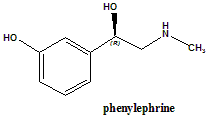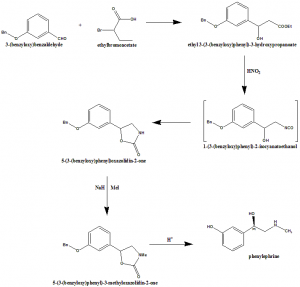PHENYLEPHRINE Synthesis, SAR, MCQ,Structure,Chemical Properties and Therapeutic Uses
Phenylephrine
IUPAC nomenclature
(R)-3-[-1-hydroxy-2-(methylamino)ethyl]phenol.

Classification
Phenylephrine is a selective α1-adrenergic agonist. [1]
Physiochemical Properties
| S. NO. | PHYSICAL AND CHEMICAL PROPERTIES | |
| 1 | Molecular weight | 162.2 g/mol |
| 2 | Physical appearance | Present in solid form |
| 3 | Melting point | 169-172°C |
| 4 | Solubility | Freely soluble in water |
| 5 | Presence of ring | Benzene ring |
| 6 | Number of chiral centers | 1 |
Mechanism of Action
- Phenylephrine is an α1-adrenergic agonist which brings vasoconstriction and mydriasis. It depends on the location of administration and route of administration.
- Systemic exposure to the drug results in agonism of α-1 adrenergic receptors, which leads to increase in systolic and diastolic pressure, and also increase in peripheral vascular resistance.
- The increase in blood pressure stimulates the vagus nerve which results in the cause of reflex bradycardia.
Structure Activity Relationship
- Primary or secondary aliphatic amine separated by two carbons from a substituted benzene ring is essential for the high agonist activity.
- The hydroxyl substituted carbon must be in the R configuration for the maximal direct activity.
R1 substitution:
- When R1 is increased in size, activity of alpha receptors decreases and activity of the beta receptors increases
- Activity of both alpha and beta receptors is maximum when R1 is methyl group.
- Alpha agonist activity decreases when R1 is larger than methyl, and went negligible when R1 is isopropyl.
- Large lipophillic groups can afford compounds with alpha blocking activity.
- N-substituent provides selectivity for different receptors.
- Arylalkyl group can provide beta selectivity, increased cell penetration and increased lipophillicity for the longer duration of action.
R2 substitution:
- Ethyl group can eliminate the alpha activity of the drug.
- Erythrostero isomers have maximal activity.
- The additional methyl group makes the drug more selective for the alpha2
R3 substitution on the aromatic ring:
- 3’,4’-dihydroxy substituted benzene ring has poor oral activity.
- 3’, 5’-dihydroxy compounds are orally active.
- At least one of the groups is required which can form hydrogen bonds. And if only one group is present then it is preferred at 4’ position to retain the beta2
- If phenyl group has no phenolic substituent then it may act directly or indirectly.[2]
Method of synthesis
i. 3-(benzyloxy)benzaldehyde reacts with ethylbromoacetate to give ethyl3-(3-(benzyloxy)phenyl)-3-hydroxypropanoate.
ii. The latter compound undergoes nitration to give an intermediatecompound which gives oxazolidone later.
iii. The compound is then reacted with sodium hydride in presence of methyliodide to give 5-(3-(benzyloxy)phenyl)-3-methyloxazolidin-2-one which on reduction gives phenylephrine.
Therapeutic Uses
The drug used for the treatment of:
- Hemorrhoids
- Hypotension
- Priapism
It is also used as a decongestatnt, for the dilation of pupil and during anasthetics.
Side Effects
Side effects of phenylephrine include hypertension, prostatic hyperplasia, hyperemia, seizures, upset stomach, abdominal cramping, vomiting issues.
Extended use of the drug causes rhinitis medicamentosa.
MCQs
Q.1 Which term is NOT associated with the drug phenylephrine?
a) DROSYN
b) N-COOL
c) PENREX
d) FLUDARA
Q.2 Melting point of Phenyephrine is?
a) 169-172 °C
b) 110-112 °C
c) 234-237 °C
d) 201-204 °C
Q.3 The drug phenylephrine shows its action through
a) Functioning as α1-adrenergic agonist
b) Functioning as ß-adrenergic agonist
c) Both a) and b)
d) None of the above
Q.4 The correct order for the synthesis of the drug Phenylephrine is?
I. Reduction
II. Reaction with sodium hydride
III. Nitration
IV. 3-(benzyloxy)benzaldehyde reacts with ethylbromoacetate
a) IV – III – II – I
b) II – IV – I – III
c) IV – II – I – III
d) IV – III – I – II
Q.5 Predict the incorrect statements from the following with respect to the classification of the drug.
I. Phenylephrine is a selective α1-adrenergic agonist
II. Epinephrine is a nonselective adrenergic agonist
III. Norepinephrine is a nonselective adrenergic agonist
a) I, II & III
b) I & II
c) II only
d) All statements related to classification are correct
Q.6 The correct sequence of True and False for the given statements with respect to the drug Phenylephrine is-
I. Phenylephrine is a selective ß-adrenergic agonist.
II. It can be synthesized from 3-(benzyloxy)benzaldehyde
III. 3 chiral centers are present in its structure
IV. It is used as a decongestant.
a) FTTF
b) TFTF
c) FTFT
d) TFFT
Q.7 Which amongst the following drugs is having highest number of ring system in its structure-
a) Phenylephrine
b) Norepinephrine
c) Morphine
d) Penicillin G
ANSWERS
1-b
2-a
3-a
4-d
5-d
6-c
7-c
REFERENCES
[1] Lemke TL, Zito SW, Roche VF, Williams DA. Essentials of Foye’s principles of medicinal chemistry. Wolters Kluwer; 2017, 340 [2] Lemke TL, Zito SW, Roche VF, Williams DA. Essentials of Foye’s principles of medicinal chemistry. Wolters Kluwer; 2017, 348-352
